A Deep Dive into the UN, ICJ, and ECOSOC: Functions and Powers
VerifiedAdded on 2022/12/15
|9
|3119
|179
Homework Assignment
AI Summary
This assignment provides a comprehensive overview of the United Nations (UN), the International Court of Justice (ICJ), and the Economic and Social Council (ECOSOC). Part I consists of true/false questions testing knowledge of the UN General Assembly, ICJ jurisdiction, and the roles of the Secretary-General and ECOSOC. Part II delves into substantive questions, including the 'democratic deficit' of the UN General Assembly, the main functions and powers of ECOSOC, legal measures to enforce ICJ decisions, the differences between jurisdictional and non-jurisdictional dispute settlement methods under Article 33 of the UN Charter, and a discussion of the UN's functions and powers. The assignment covers key aspects of international law, dispute resolution, and the operations of major international organizations.
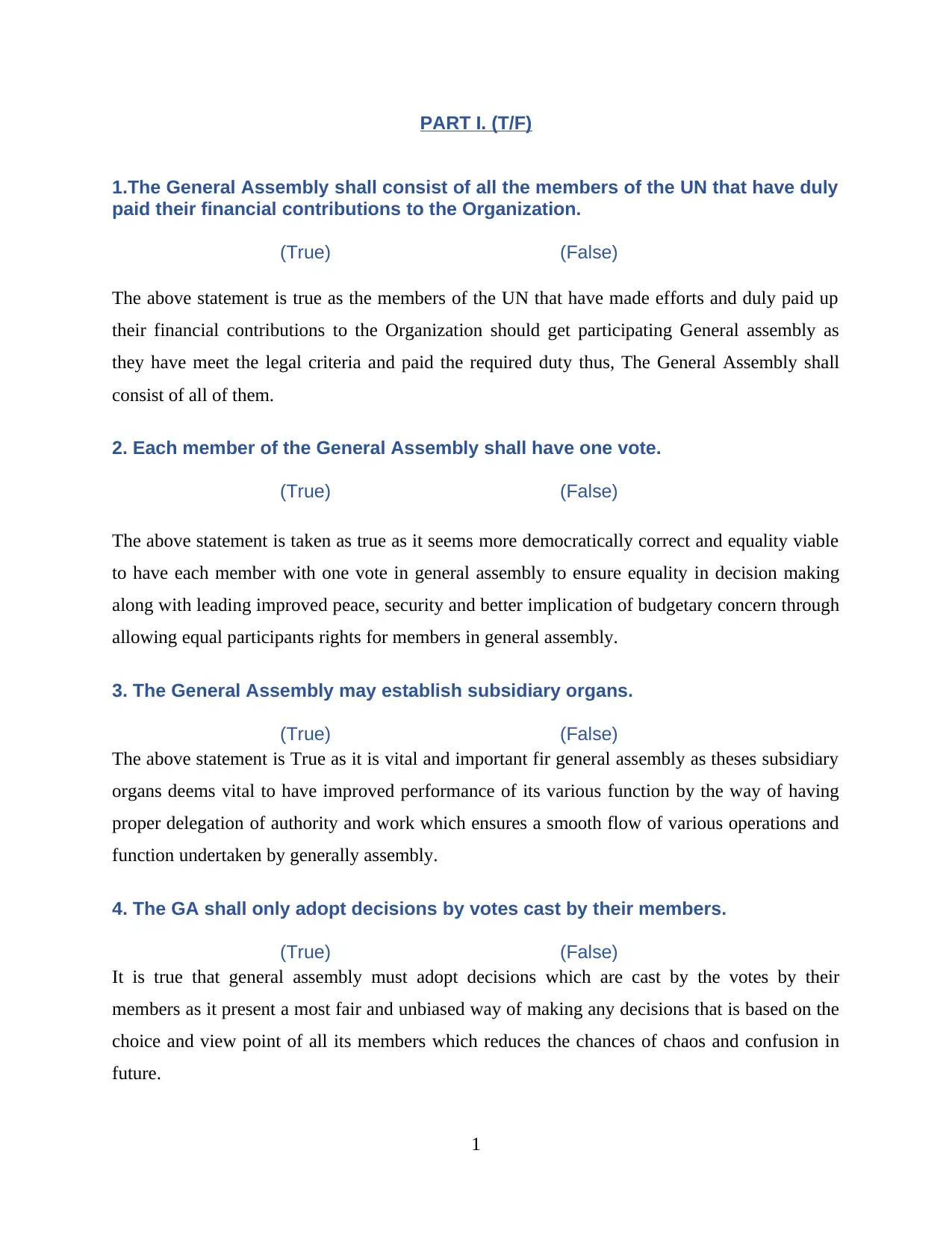
PART I. (T/F)
1.The General Assembly shall consist of all the members of the UN that have duly
paid their financial contributions to the Organization.
(True) (False)
The above statement is true as the members of the UN that have made efforts and duly paid up
their financial contributions to the Organization should get participating General assembly as
they have meet the legal criteria and paid the required duty thus, The General Assembly shall
consist of all of them.
2. Each member of the General Assembly shall have one vote.
(True) (False)
The above statement is taken as true as it seems more democratically correct and equality viable
to have each member with one vote in general assembly to ensure equality in decision making
along with leading improved peace, security and better implication of budgetary concern through
allowing equal participants rights for members in general assembly.
3. The General Assembly may establish subsidiary organs.
(True) (False)
The above statement is True as it is vital and important fir general assembly as theses subsidiary
organs deems vital to have improved performance of its various function by the way of having
proper delegation of authority and work which ensures a smooth flow of various operations and
function undertaken by generally assembly.
4. The GA shall only adopt decisions by votes cast by their members.
(True) (False)
It is true that general assembly must adopt decisions which are cast by the votes by their
members as it present a most fair and unbiased way of making any decisions that is based on the
choice and view point of all its members which reduces the chances of chaos and confusion in
future.
1
1.The General Assembly shall consist of all the members of the UN that have duly
paid their financial contributions to the Organization.
(True) (False)
The above statement is true as the members of the UN that have made efforts and duly paid up
their financial contributions to the Organization should get participating General assembly as
they have meet the legal criteria and paid the required duty thus, The General Assembly shall
consist of all of them.
2. Each member of the General Assembly shall have one vote.
(True) (False)
The above statement is taken as true as it seems more democratically correct and equality viable
to have each member with one vote in general assembly to ensure equality in decision making
along with leading improved peace, security and better implication of budgetary concern through
allowing equal participants rights for members in general assembly.
3. The General Assembly may establish subsidiary organs.
(True) (False)
The above statement is True as it is vital and important fir general assembly as theses subsidiary
organs deems vital to have improved performance of its various function by the way of having
proper delegation of authority and work which ensures a smooth flow of various operations and
function undertaken by generally assembly.
4. The GA shall only adopt decisions by votes cast by their members.
(True) (False)
It is true that general assembly must adopt decisions which are cast by the votes by their
members as it present a most fair and unbiased way of making any decisions that is based on the
choice and view point of all its members which reduces the chances of chaos and confusion in
future.
1
Paraphrase This Document
Need a fresh take? Get an instant paraphrase of this document with our AI Paraphraser
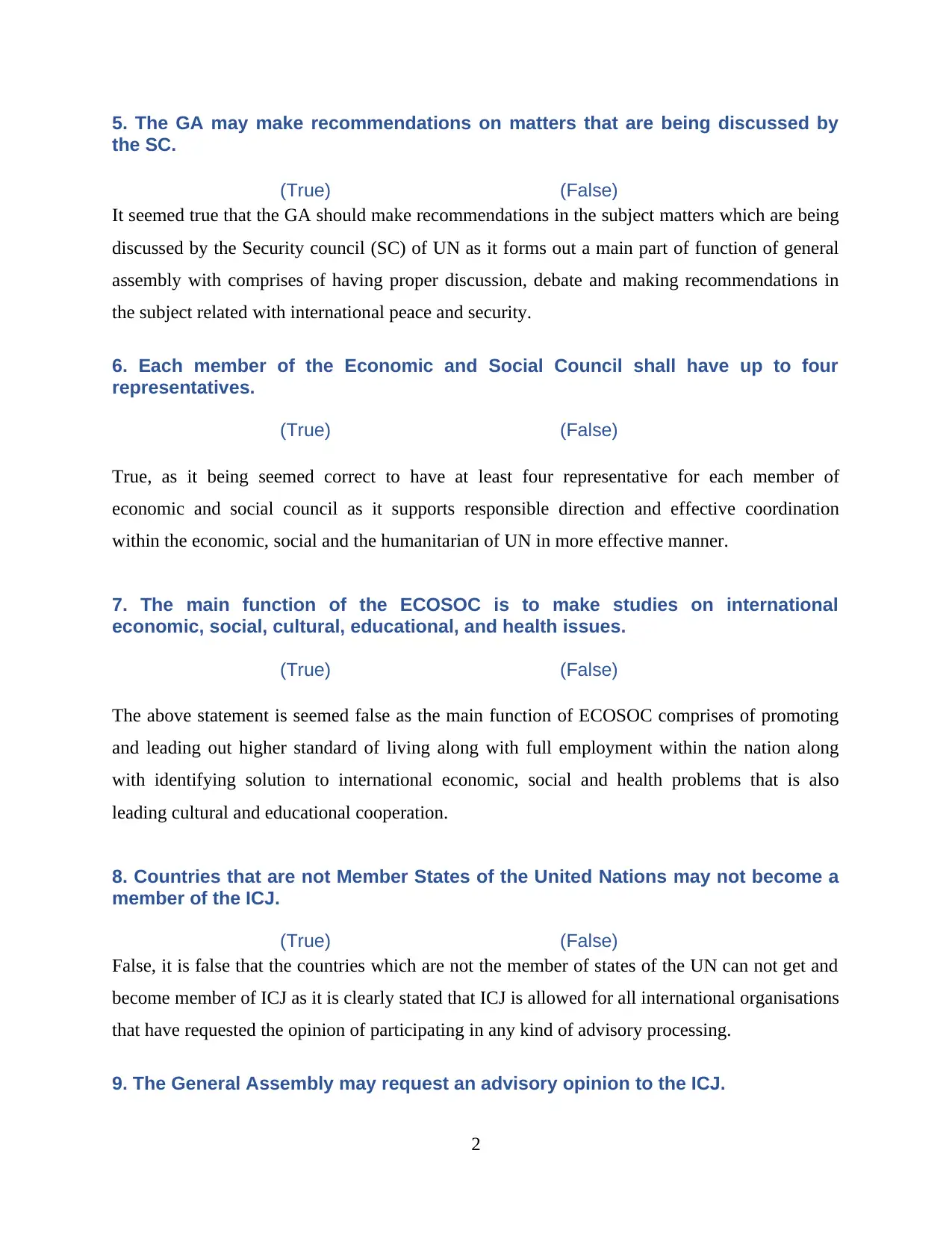
5. The GA may make recommendations on matters that are being discussed by
the SC.
(True) (False)
It seemed true that the GA should make recommendations in the subject matters which are being
discussed by the Security council (SC) of UN as it forms out a main part of function of general
assembly with comprises of having proper discussion, debate and making recommendations in
the subject related with international peace and security.
6. Each member of the Economic and Social Council shall have up to four
representatives.
(True) (False)
True, as it being seemed correct to have at least four representative for each member of
economic and social council as it supports responsible direction and effective coordination
within the economic, social and the humanitarian of UN in more effective manner.
7. The main function of the ECOSOC is to make studies on international
economic, social, cultural, educational, and health issues.
(True) (False)
The above statement is seemed false as the main function of ECOSOC comprises of promoting
and leading out higher standard of living along with full employment within the nation along
with identifying solution to international economic, social and health problems that is also
leading cultural and educational cooperation.
8. Countries that are not Member States of the United Nations may not become a
member of the ICJ.
(True) (False)
False, it is false that the countries which are not the member of states of the UN can not get and
become member of ICJ as it is clearly stated that ICJ is allowed for all international organisations
that have requested the opinion of participating in any kind of advisory processing.
9. The General Assembly may request an advisory opinion to the ICJ.
2
the SC.
(True) (False)
It seemed true that the GA should make recommendations in the subject matters which are being
discussed by the Security council (SC) of UN as it forms out a main part of function of general
assembly with comprises of having proper discussion, debate and making recommendations in
the subject related with international peace and security.
6. Each member of the Economic and Social Council shall have up to four
representatives.
(True) (False)
True, as it being seemed correct to have at least four representative for each member of
economic and social council as it supports responsible direction and effective coordination
within the economic, social and the humanitarian of UN in more effective manner.
7. The main function of the ECOSOC is to make studies on international
economic, social, cultural, educational, and health issues.
(True) (False)
The above statement is seemed false as the main function of ECOSOC comprises of promoting
and leading out higher standard of living along with full employment within the nation along
with identifying solution to international economic, social and health problems that is also
leading cultural and educational cooperation.
8. Countries that are not Member States of the United Nations may not become a
member of the ICJ.
(True) (False)
False, it is false that the countries which are not the member of states of the UN can not get and
become member of ICJ as it is clearly stated that ICJ is allowed for all international organisations
that have requested the opinion of participating in any kind of advisory processing.
9. The General Assembly may request an advisory opinion to the ICJ.
2
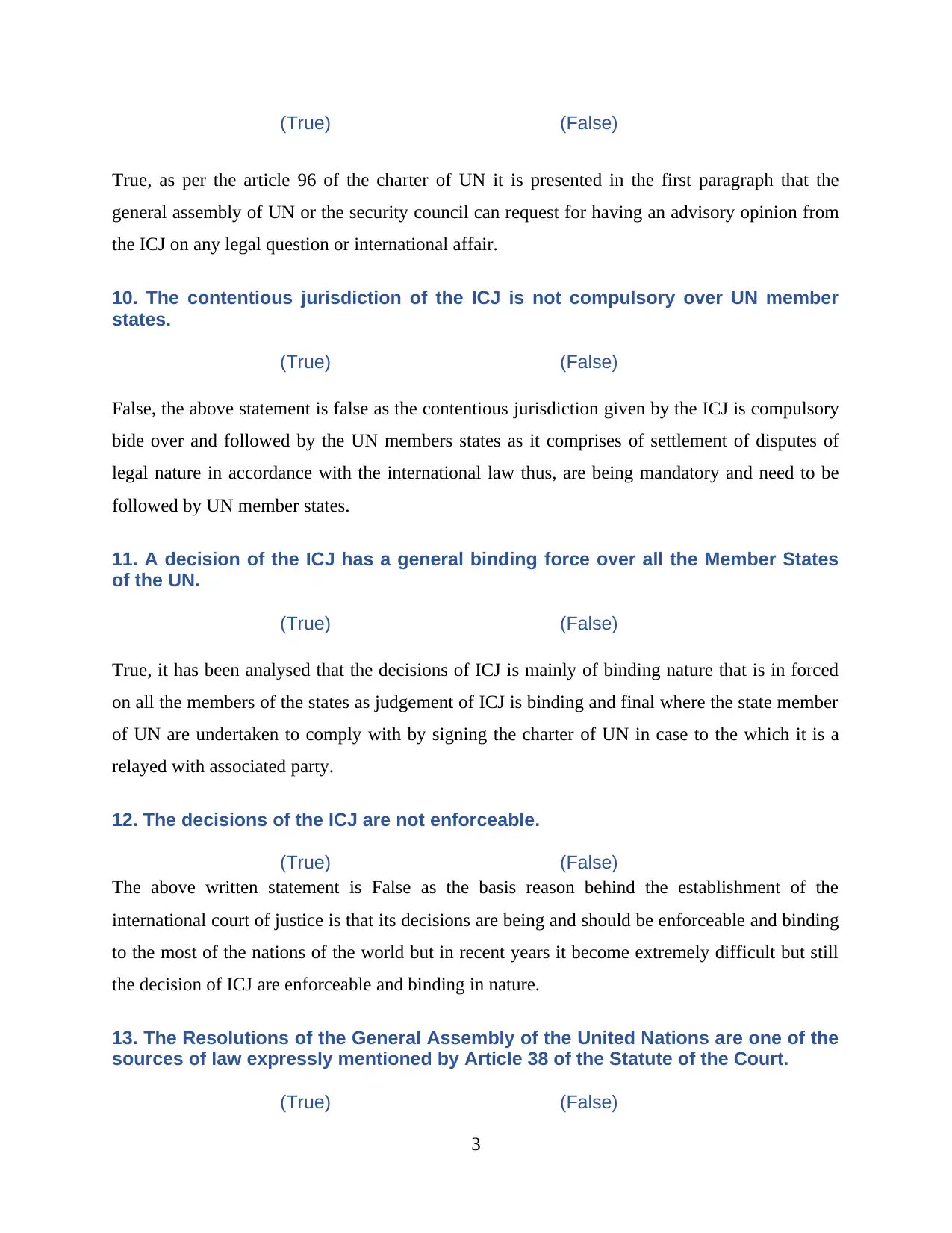
(True) (False)
True, as per the article 96 of the charter of UN it is presented in the first paragraph that the
general assembly of UN or the security council can request for having an advisory opinion from
the ICJ on any legal question or international affair.
10. The contentious jurisdiction of the ICJ is not compulsory over UN member
states.
(True) (False)
False, the above statement is false as the contentious jurisdiction given by the ICJ is compulsory
bide over and followed by the UN members states as it comprises of settlement of disputes of
legal nature in accordance with the international law thus, are being mandatory and need to be
followed by UN member states.
11. A decision of the ICJ has a general binding force over all the Member States
of the UN.
(True) (False)
True, it has been analysed that the decisions of ICJ is mainly of binding nature that is in forced
on all the members of the states as judgement of ICJ is binding and final where the state member
of UN are undertaken to comply with by signing the charter of UN in case to the which it is a
relayed with associated party.
12. The decisions of the ICJ are not enforceable.
(True) (False)
The above written statement is False as the basis reason behind the establishment of the
international court of justice is that its decisions are being and should be enforceable and binding
to the most of the nations of the world but in recent years it become extremely difficult but still
the decision of ICJ are enforceable and binding in nature.
13. The Resolutions of the General Assembly of the United Nations are one of the
sources of law expressly mentioned by Article 38 of the Statute of the Court.
(True) (False)
3
True, as per the article 96 of the charter of UN it is presented in the first paragraph that the
general assembly of UN or the security council can request for having an advisory opinion from
the ICJ on any legal question or international affair.
10. The contentious jurisdiction of the ICJ is not compulsory over UN member
states.
(True) (False)
False, the above statement is false as the contentious jurisdiction given by the ICJ is compulsory
bide over and followed by the UN members states as it comprises of settlement of disputes of
legal nature in accordance with the international law thus, are being mandatory and need to be
followed by UN member states.
11. A decision of the ICJ has a general binding force over all the Member States
of the UN.
(True) (False)
True, it has been analysed that the decisions of ICJ is mainly of binding nature that is in forced
on all the members of the states as judgement of ICJ is binding and final where the state member
of UN are undertaken to comply with by signing the charter of UN in case to the which it is a
relayed with associated party.
12. The decisions of the ICJ are not enforceable.
(True) (False)
The above written statement is False as the basis reason behind the establishment of the
international court of justice is that its decisions are being and should be enforceable and binding
to the most of the nations of the world but in recent years it become extremely difficult but still
the decision of ICJ are enforceable and binding in nature.
13. The Resolutions of the General Assembly of the United Nations are one of the
sources of law expressly mentioned by Article 38 of the Statute of the Court.
(True) (False)
3
⊘ This is a preview!⊘
Do you want full access?
Subscribe today to unlock all pages.

Trusted by 1+ million students worldwide
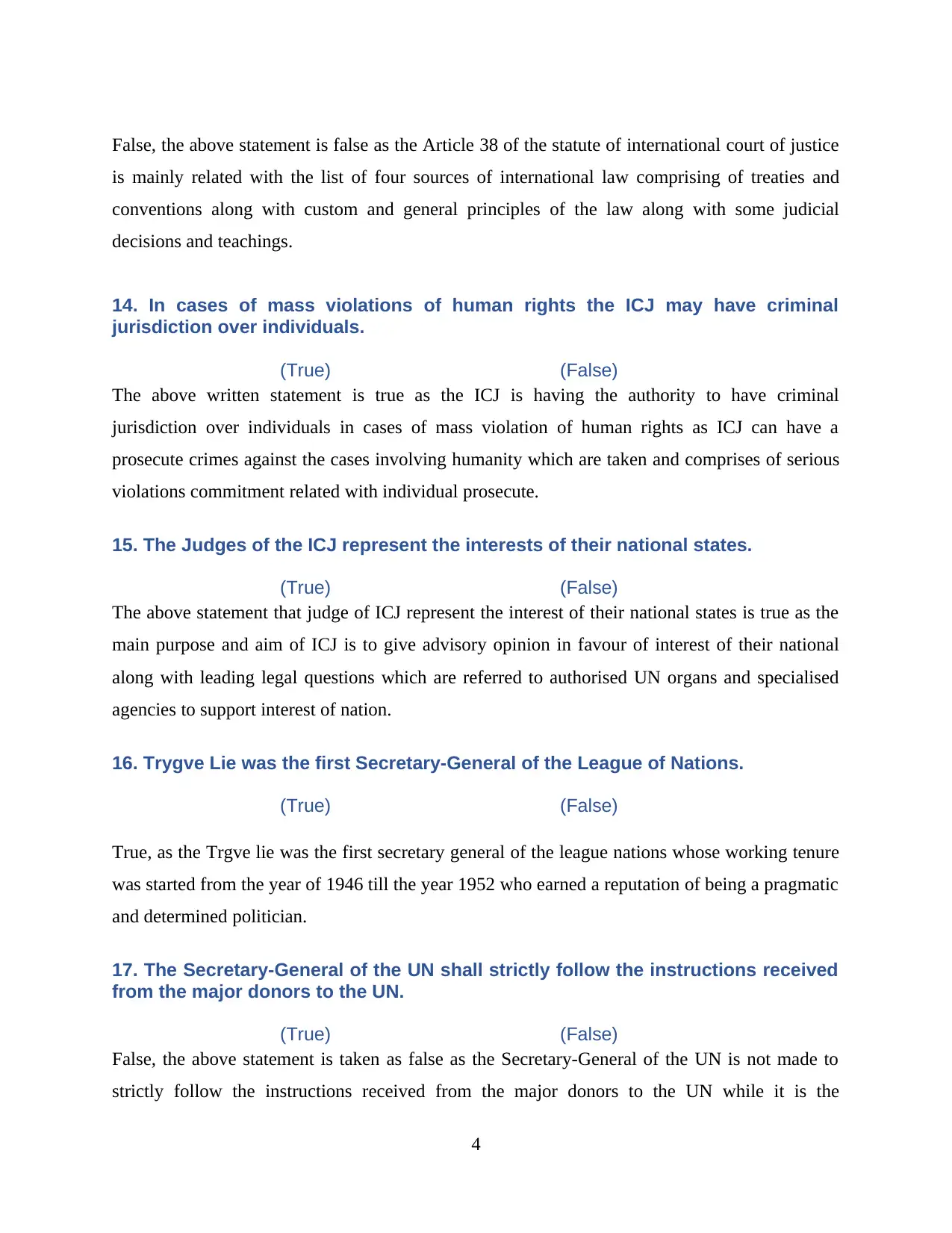
False, the above statement is false as the Article 38 of the statute of international court of justice
is mainly related with the list of four sources of international law comprising of treaties and
conventions along with custom and general principles of the law along with some judicial
decisions and teachings.
14. In cases of mass violations of human rights the ICJ may have criminal
jurisdiction over individuals.
(True) (False)
The above written statement is true as the ICJ is having the authority to have criminal
jurisdiction over individuals in cases of mass violation of human rights as ICJ can have a
prosecute crimes against the cases involving humanity which are taken and comprises of serious
violations commitment related with individual prosecute.
15. The Judges of the ICJ represent the interests of their national states.
(True) (False)
The above statement that judge of ICJ represent the interest of their national states is true as the
main purpose and aim of ICJ is to give advisory opinion in favour of interest of their national
along with leading legal questions which are referred to authorised UN organs and specialised
agencies to support interest of nation.
16. Trygve Lie was the first Secretary-General of the League of Nations.
(True) (False)
True, as the Trgve lie was the first secretary general of the league nations whose working tenure
was started from the year of 1946 till the year 1952 who earned a reputation of being a pragmatic
and determined politician.
17. The Secretary-General of the UN shall strictly follow the instructions received
from the major donors to the UN.
(True) (False)
False, the above statement is taken as false as the Secretary-General of the UN is not made to
strictly follow the instructions received from the major donors to the UN while it is the
4
is mainly related with the list of four sources of international law comprising of treaties and
conventions along with custom and general principles of the law along with some judicial
decisions and teachings.
14. In cases of mass violations of human rights the ICJ may have criminal
jurisdiction over individuals.
(True) (False)
The above written statement is true as the ICJ is having the authority to have criminal
jurisdiction over individuals in cases of mass violation of human rights as ICJ can have a
prosecute crimes against the cases involving humanity which are taken and comprises of serious
violations commitment related with individual prosecute.
15. The Judges of the ICJ represent the interests of their national states.
(True) (False)
The above statement that judge of ICJ represent the interest of their national states is true as the
main purpose and aim of ICJ is to give advisory opinion in favour of interest of their national
along with leading legal questions which are referred to authorised UN organs and specialised
agencies to support interest of nation.
16. Trygve Lie was the first Secretary-General of the League of Nations.
(True) (False)
True, as the Trgve lie was the first secretary general of the league nations whose working tenure
was started from the year of 1946 till the year 1952 who earned a reputation of being a pragmatic
and determined politician.
17. The Secretary-General of the UN shall strictly follow the instructions received
from the major donors to the UN.
(True) (False)
False, the above statement is taken as false as the Secretary-General of the UN is not made to
strictly follow the instructions received from the major donors to the UN while it is the
4
Paraphrase This Document
Need a fresh take? Get an instant paraphrase of this document with our AI Paraphraser
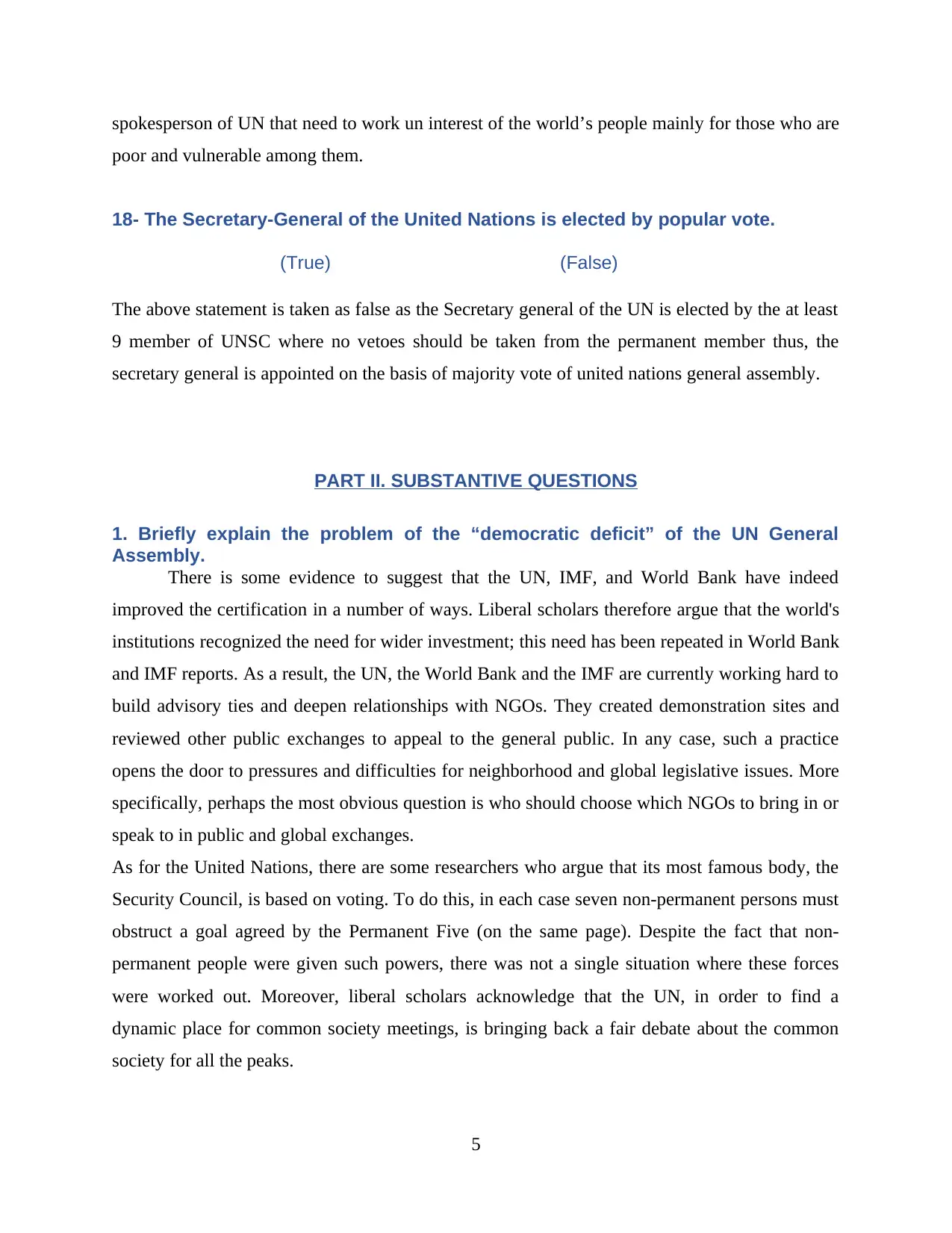
spokesperson of UN that need to work un interest of the world’s people mainly for those who are
poor and vulnerable among them.
18- The Secretary-General of the United Nations is elected by popular vote.
(True) (False)
The above statement is taken as false as the Secretary general of the UN is elected by the at least
9 member of UNSC where no vetoes should be taken from the permanent member thus, the
secretary general is appointed on the basis of majority vote of united nations general assembly.
PART II. SUBSTANTIVE QUESTIONS
1. Briefly explain the problem of the “democratic deficit” of the UN General
Assembly.
There is some evidence to suggest that the UN, IMF, and World Bank have indeed
improved the certification in a number of ways. Liberal scholars therefore argue that the world's
institutions recognized the need for wider investment; this need has been repeated in World Bank
and IMF reports. As a result, the UN, the World Bank and the IMF are currently working hard to
build advisory ties and deepen relationships with NGOs. They created demonstration sites and
reviewed other public exchanges to appeal to the general public. In any case, such a practice
opens the door to pressures and difficulties for neighborhood and global legislative issues. More
specifically, perhaps the most obvious question is who should choose which NGOs to bring in or
speak to in public and global exchanges.
As for the United Nations, there are some researchers who argue that its most famous body, the
Security Council, is based on voting. To do this, in each case seven non-permanent persons must
obstruct a goal agreed by the Permanent Five (on the same page). Despite the fact that non-
permanent people were given such powers, there was not a single situation where these forces
were worked out. Moreover, liberal scholars acknowledge that the UN, in order to find a
dynamic place for common society meetings, is bringing back a fair debate about the common
society for all the peaks.
5
poor and vulnerable among them.
18- The Secretary-General of the United Nations is elected by popular vote.
(True) (False)
The above statement is taken as false as the Secretary general of the UN is elected by the at least
9 member of UNSC where no vetoes should be taken from the permanent member thus, the
secretary general is appointed on the basis of majority vote of united nations general assembly.
PART II. SUBSTANTIVE QUESTIONS
1. Briefly explain the problem of the “democratic deficit” of the UN General
Assembly.
There is some evidence to suggest that the UN, IMF, and World Bank have indeed
improved the certification in a number of ways. Liberal scholars therefore argue that the world's
institutions recognized the need for wider investment; this need has been repeated in World Bank
and IMF reports. As a result, the UN, the World Bank and the IMF are currently working hard to
build advisory ties and deepen relationships with NGOs. They created demonstration sites and
reviewed other public exchanges to appeal to the general public. In any case, such a practice
opens the door to pressures and difficulties for neighborhood and global legislative issues. More
specifically, perhaps the most obvious question is who should choose which NGOs to bring in or
speak to in public and global exchanges.
As for the United Nations, there are some researchers who argue that its most famous body, the
Security Council, is based on voting. To do this, in each case seven non-permanent persons must
obstruct a goal agreed by the Permanent Five (on the same page). Despite the fact that non-
permanent people were given such powers, there was not a single situation where these forces
were worked out. Moreover, liberal scholars acknowledge that the UN, in order to find a
dynamic place for common society meetings, is bringing back a fair debate about the common
society for all the peaks.
5
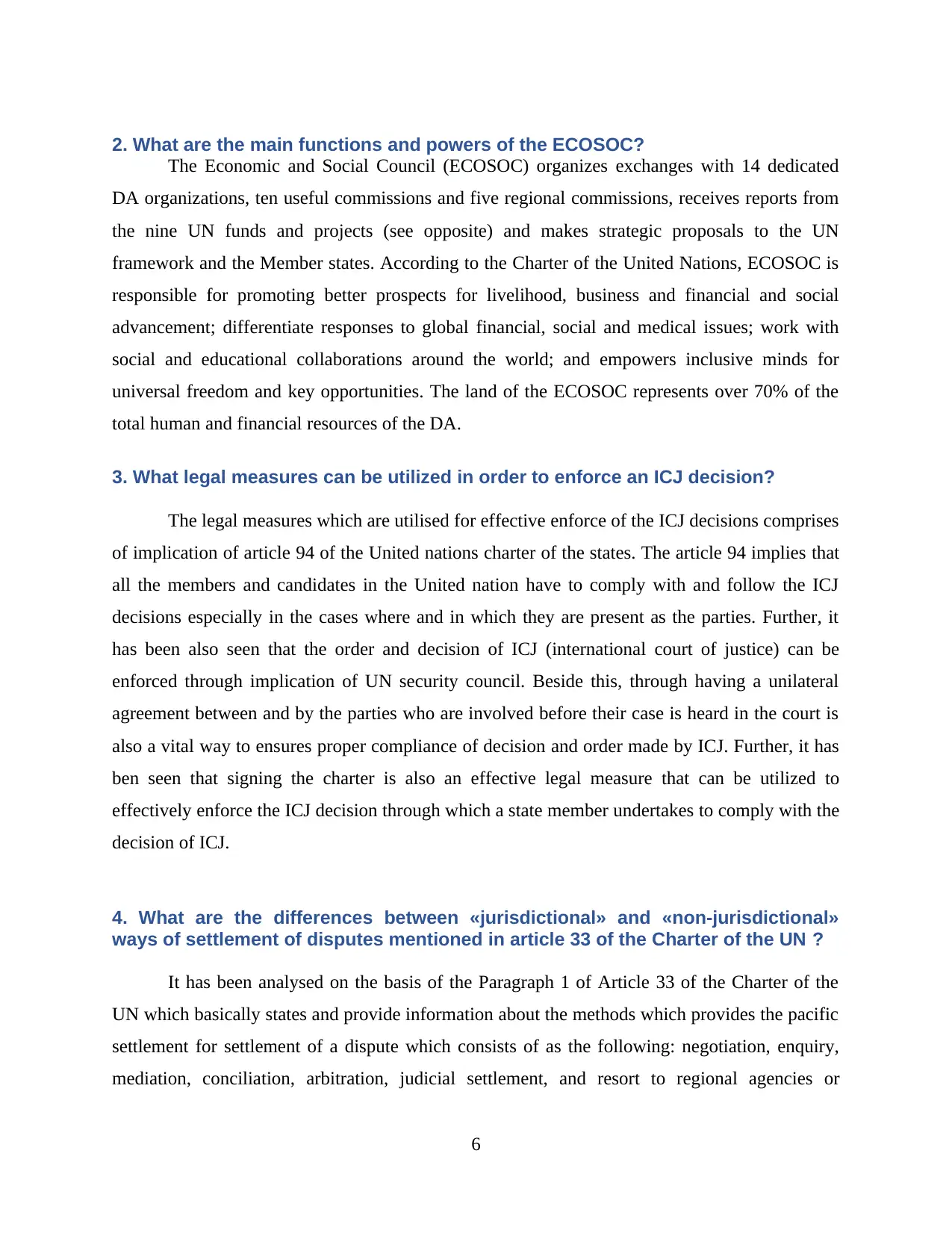
2. What are the main functions and powers of the ECOSOC?
The Economic and Social Council (ECOSOC) organizes exchanges with 14 dedicated
DA organizations, ten useful commissions and five regional commissions, receives reports from
the nine UN funds and projects (see opposite) and makes strategic proposals to the UN
framework and the Member states. According to the Charter of the United Nations, ECOSOC is
responsible for promoting better prospects for livelihood, business and financial and social
advancement; differentiate responses to global financial, social and medical issues; work with
social and educational collaborations around the world; and empowers inclusive minds for
universal freedom and key opportunities. The land of the ECOSOC represents over 70% of the
total human and financial resources of the DA.
3. What legal measures can be utilized in order to enforce an ICJ decision?
The legal measures which are utilised for effective enforce of the ICJ decisions comprises
of implication of article 94 of the United nations charter of the states. The article 94 implies that
all the members and candidates in the United nation have to comply with and follow the ICJ
decisions especially in the cases where and in which they are present as the parties. Further, it
has been also seen that the order and decision of ICJ (international court of justice) can be
enforced through implication of UN security council. Beside this, through having a unilateral
agreement between and by the parties who are involved before their case is heard in the court is
also a vital way to ensures proper compliance of decision and order made by ICJ. Further, it has
ben seen that signing the charter is also an effective legal measure that can be utilized to
effectively enforce the ICJ decision through which a state member undertakes to comply with the
decision of ICJ.
4. What are the differences between «jurisdictional» and «non-jurisdictional»
ways of settlement of disputes mentioned in article 33 of the Charter of the UN ?
It has been analysed on the basis of the Paragraph 1 of Article 33 of the Charter of the
UN which basically states and provide information about the methods which provides the pacific
settlement for settlement of a dispute which consists of as the following: negotiation, enquiry,
mediation, conciliation, arbitration, judicial settlement, and resort to regional agencies or
6
The Economic and Social Council (ECOSOC) organizes exchanges with 14 dedicated
DA organizations, ten useful commissions and five regional commissions, receives reports from
the nine UN funds and projects (see opposite) and makes strategic proposals to the UN
framework and the Member states. According to the Charter of the United Nations, ECOSOC is
responsible for promoting better prospects for livelihood, business and financial and social
advancement; differentiate responses to global financial, social and medical issues; work with
social and educational collaborations around the world; and empowers inclusive minds for
universal freedom and key opportunities. The land of the ECOSOC represents over 70% of the
total human and financial resources of the DA.
3. What legal measures can be utilized in order to enforce an ICJ decision?
The legal measures which are utilised for effective enforce of the ICJ decisions comprises
of implication of article 94 of the United nations charter of the states. The article 94 implies that
all the members and candidates in the United nation have to comply with and follow the ICJ
decisions especially in the cases where and in which they are present as the parties. Further, it
has been also seen that the order and decision of ICJ (international court of justice) can be
enforced through implication of UN security council. Beside this, through having a unilateral
agreement between and by the parties who are involved before their case is heard in the court is
also a vital way to ensures proper compliance of decision and order made by ICJ. Further, it has
ben seen that signing the charter is also an effective legal measure that can be utilized to
effectively enforce the ICJ decision through which a state member undertakes to comply with the
decision of ICJ.
4. What are the differences between «jurisdictional» and «non-jurisdictional»
ways of settlement of disputes mentioned in article 33 of the Charter of the UN ?
It has been analysed on the basis of the Paragraph 1 of Article 33 of the Charter of the
UN which basically states and provide information about the methods which provides the pacific
settlement for settlement of a dispute which consists of as the following: negotiation, enquiry,
mediation, conciliation, arbitration, judicial settlement, and resort to regional agencies or
6
⊘ This is a preview!⊘
Do you want full access?
Subscribe today to unlock all pages.

Trusted by 1+ million students worldwide
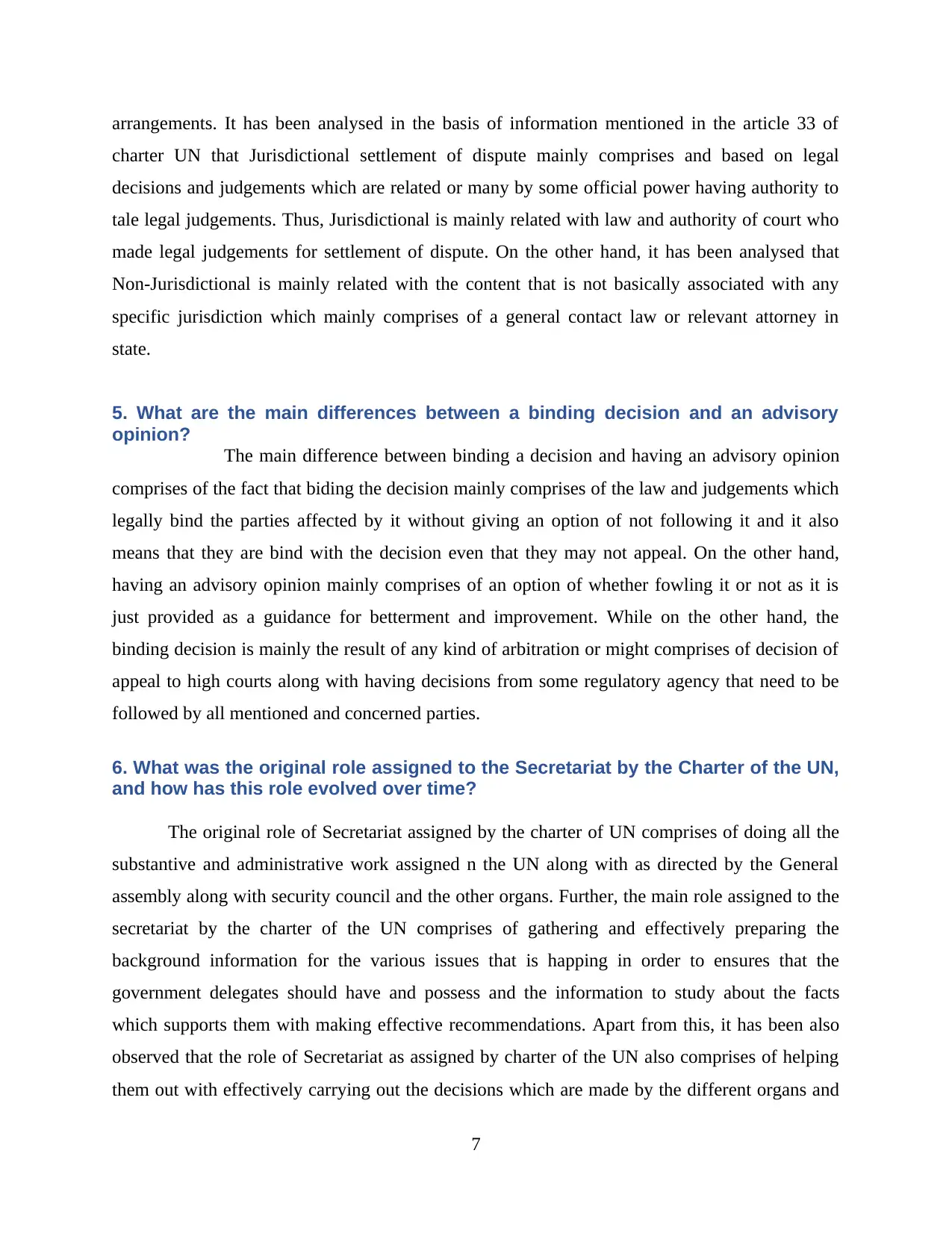
arrangements. It has been analysed in the basis of information mentioned in the article 33 of
charter UN that Jurisdictional settlement of dispute mainly comprises and based on legal
decisions and judgements which are related or many by some official power having authority to
tale legal judgements. Thus, Jurisdictional is mainly related with law and authority of court who
made legal judgements for settlement of dispute. On the other hand, it has been analysed that
Non-Jurisdictional is mainly related with the content that is not basically associated with any
specific jurisdiction which mainly comprises of a general contact law or relevant attorney in
state.
5. What are the main differences between a binding decision and an advisory
opinion?
The main difference between binding a decision and having an advisory opinion
comprises of the fact that biding the decision mainly comprises of the law and judgements which
legally bind the parties affected by it without giving an option of not following it and it also
means that they are bind with the decision even that they may not appeal. On the other hand,
having an advisory opinion mainly comprises of an option of whether fowling it or not as it is
just provided as a guidance for betterment and improvement. While on the other hand, the
binding decision is mainly the result of any kind of arbitration or might comprises of decision of
appeal to high courts along with having decisions from some regulatory agency that need to be
followed by all mentioned and concerned parties.
6. What was the original role assigned to the Secretariat by the Charter of the UN,
and how has this role evolved over time?
The original role of Secretariat assigned by the charter of UN comprises of doing all the
substantive and administrative work assigned n the UN along with as directed by the General
assembly along with security council and the other organs. Further, the main role assigned to the
secretariat by the charter of the UN comprises of gathering and effectively preparing the
background information for the various issues that is happing in order to ensures that the
government delegates should have and possess and the information to study about the facts
which supports them with making effective recommendations. Apart from this, it has been also
observed that the role of Secretariat as assigned by charter of the UN also comprises of helping
them out with effectively carrying out the decisions which are made by the different organs and
7
charter UN that Jurisdictional settlement of dispute mainly comprises and based on legal
decisions and judgements which are related or many by some official power having authority to
tale legal judgements. Thus, Jurisdictional is mainly related with law and authority of court who
made legal judgements for settlement of dispute. On the other hand, it has been analysed that
Non-Jurisdictional is mainly related with the content that is not basically associated with any
specific jurisdiction which mainly comprises of a general contact law or relevant attorney in
state.
5. What are the main differences between a binding decision and an advisory
opinion?
The main difference between binding a decision and having an advisory opinion
comprises of the fact that biding the decision mainly comprises of the law and judgements which
legally bind the parties affected by it without giving an option of not following it and it also
means that they are bind with the decision even that they may not appeal. On the other hand,
having an advisory opinion mainly comprises of an option of whether fowling it or not as it is
just provided as a guidance for betterment and improvement. While on the other hand, the
binding decision is mainly the result of any kind of arbitration or might comprises of decision of
appeal to high courts along with having decisions from some regulatory agency that need to be
followed by all mentioned and concerned parties.
6. What was the original role assigned to the Secretariat by the Charter of the UN,
and how has this role evolved over time?
The original role of Secretariat assigned by the charter of UN comprises of doing all the
substantive and administrative work assigned n the UN along with as directed by the General
assembly along with security council and the other organs. Further, the main role assigned to the
secretariat by the charter of the UN comprises of gathering and effectively preparing the
background information for the various issues that is happing in order to ensures that the
government delegates should have and possess and the information to study about the facts
which supports them with making effective recommendations. Apart from this, it has been also
observed that the role of Secretariat as assigned by charter of the UN also comprises of helping
them out with effectively carrying out the decisions which are made by the different organs and
7
Paraphrase This Document
Need a fresh take? Get an instant paraphrase of this document with our AI Paraphraser
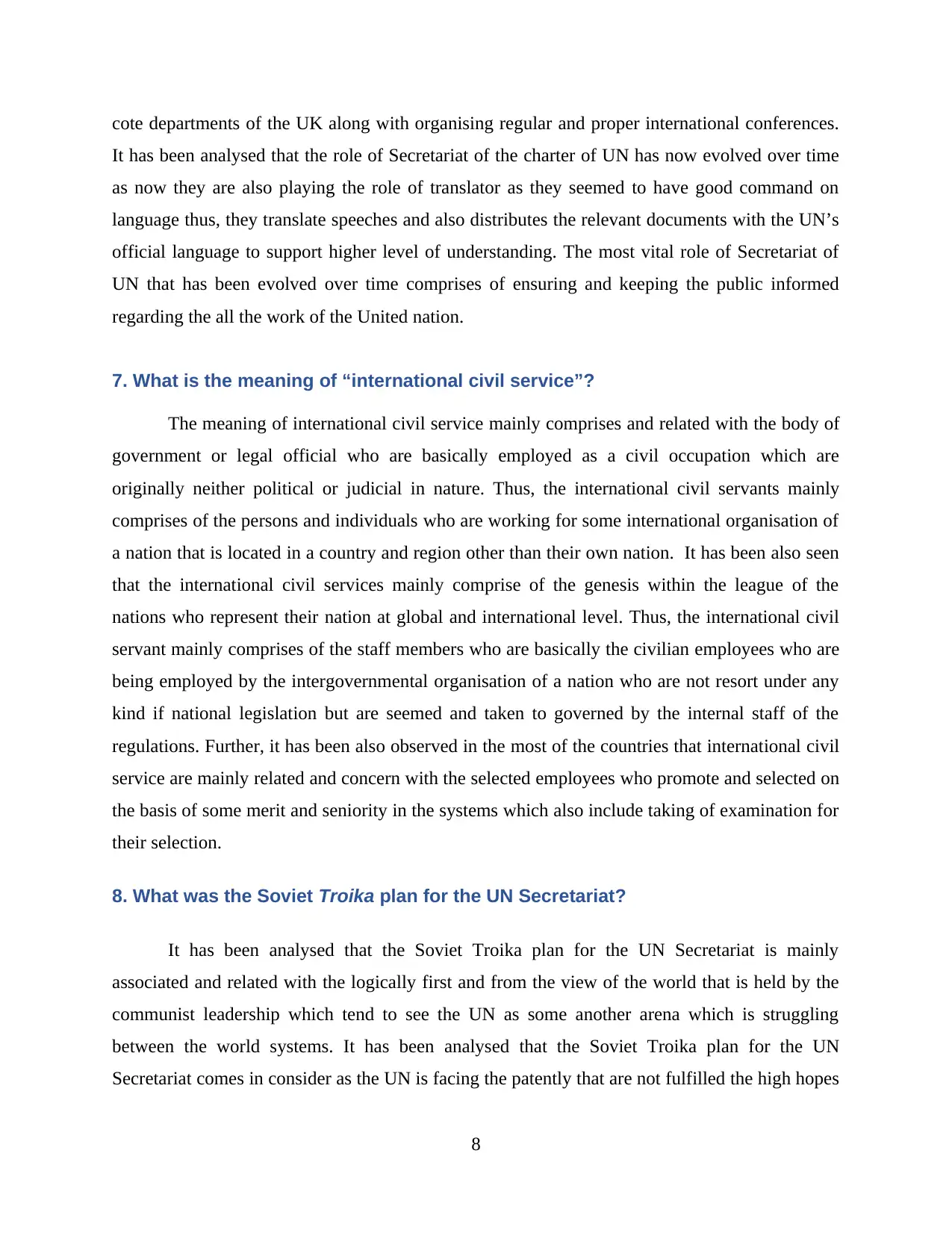
cote departments of the UK along with organising regular and proper international conferences.
It has been analysed that the role of Secretariat of the charter of UN has now evolved over time
as now they are also playing the role of translator as they seemed to have good command on
language thus, they translate speeches and also distributes the relevant documents with the UN’s
official language to support higher level of understanding. The most vital role of Secretariat of
UN that has been evolved over time comprises of ensuring and keeping the public informed
regarding the all the work of the United nation.
7. What is the meaning of “international civil service”?
The meaning of international civil service mainly comprises and related with the body of
government or legal official who are basically employed as a civil occupation which are
originally neither political or judicial in nature. Thus, the international civil servants mainly
comprises of the persons and individuals who are working for some international organisation of
a nation that is located in a country and region other than their own nation. It has been also seen
that the international civil services mainly comprise of the genesis within the league of the
nations who represent their nation at global and international level. Thus, the international civil
servant mainly comprises of the staff members who are basically the civilian employees who are
being employed by the intergovernmental organisation of a nation who are not resort under any
kind if national legislation but are seemed and taken to governed by the internal staff of the
regulations. Further, it has been also observed in the most of the countries that international civil
service are mainly related and concern with the selected employees who promote and selected on
the basis of some merit and seniority in the systems which also include taking of examination for
their selection.
8. What was the Soviet Troika plan for the UN Secretariat?
It has been analysed that the Soviet Troika plan for the UN Secretariat is mainly
associated and related with the logically first and from the view of the world that is held by the
communist leadership which tend to see the UN as some another arena which is struggling
between the world systems. It has been analysed that the Soviet Troika plan for the UN
Secretariat comes in consider as the UN is facing the patently that are not fulfilled the high hopes
8
It has been analysed that the role of Secretariat of the charter of UN has now evolved over time
as now they are also playing the role of translator as they seemed to have good command on
language thus, they translate speeches and also distributes the relevant documents with the UN’s
official language to support higher level of understanding. The most vital role of Secretariat of
UN that has been evolved over time comprises of ensuring and keeping the public informed
regarding the all the work of the United nation.
7. What is the meaning of “international civil service”?
The meaning of international civil service mainly comprises and related with the body of
government or legal official who are basically employed as a civil occupation which are
originally neither political or judicial in nature. Thus, the international civil servants mainly
comprises of the persons and individuals who are working for some international organisation of
a nation that is located in a country and region other than their own nation. It has been also seen
that the international civil services mainly comprise of the genesis within the league of the
nations who represent their nation at global and international level. Thus, the international civil
servant mainly comprises of the staff members who are basically the civilian employees who are
being employed by the intergovernmental organisation of a nation who are not resort under any
kind if national legislation but are seemed and taken to governed by the internal staff of the
regulations. Further, it has been also observed in the most of the countries that international civil
service are mainly related and concern with the selected employees who promote and selected on
the basis of some merit and seniority in the systems which also include taking of examination for
their selection.
8. What was the Soviet Troika plan for the UN Secretariat?
It has been analysed that the Soviet Troika plan for the UN Secretariat is mainly
associated and related with the logically first and from the view of the world that is held by the
communist leadership which tend to see the UN as some another arena which is struggling
between the world systems. It has been analysed that the Soviet Troika plan for the UN
Secretariat comes in consider as the UN is facing the patently that are not fulfilled the high hopes
8
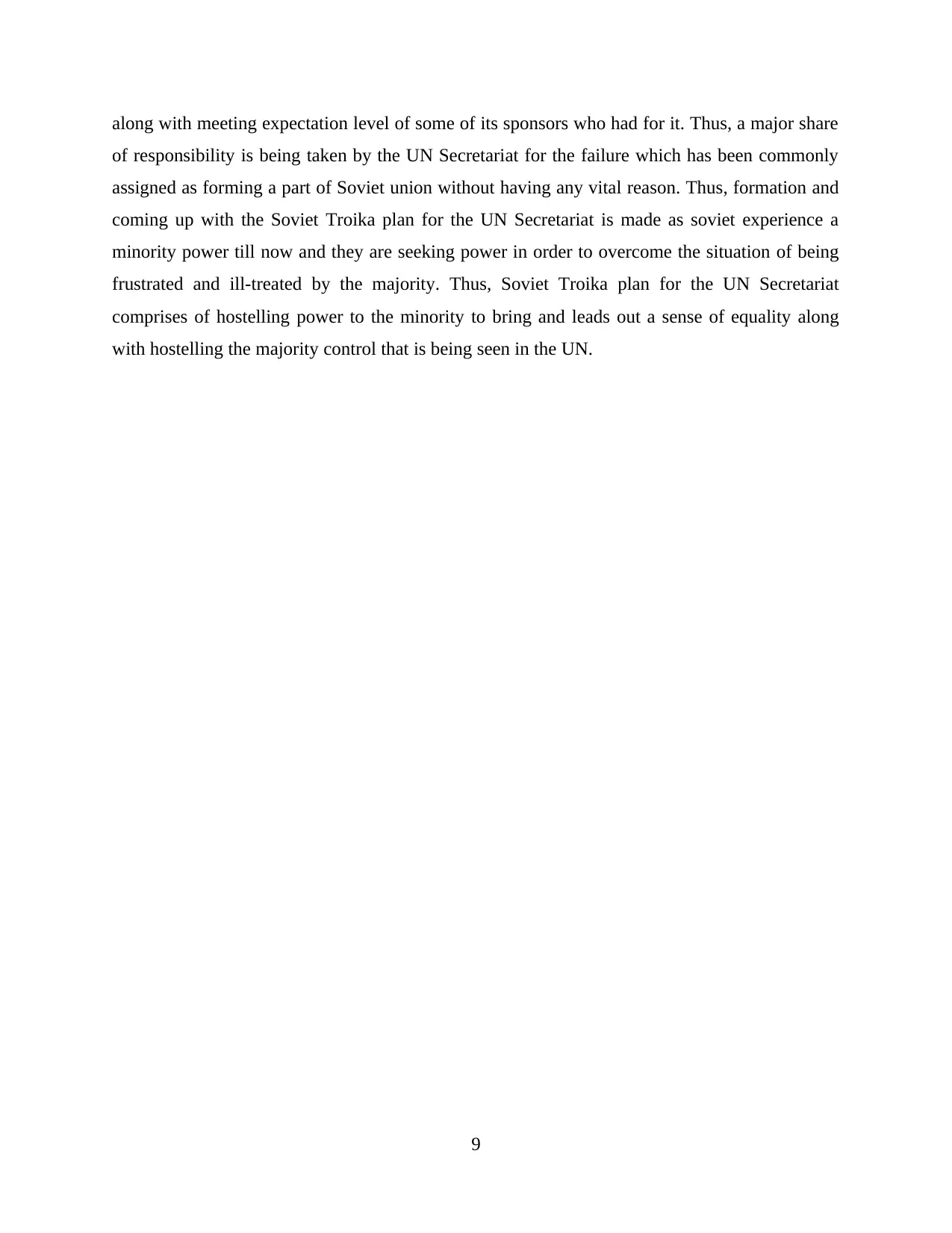
along with meeting expectation level of some of its sponsors who had for it. Thus, a major share
of responsibility is being taken by the UN Secretariat for the failure which has been commonly
assigned as forming a part of Soviet union without having any vital reason. Thus, formation and
coming up with the Soviet Troika plan for the UN Secretariat is made as soviet experience a
minority power till now and they are seeking power in order to overcome the situation of being
frustrated and ill-treated by the majority. Thus, Soviet Troika plan for the UN Secretariat
comprises of hostelling power to the minority to bring and leads out a sense of equality along
with hostelling the majority control that is being seen in the UN.
9
of responsibility is being taken by the UN Secretariat for the failure which has been commonly
assigned as forming a part of Soviet union without having any vital reason. Thus, formation and
coming up with the Soviet Troika plan for the UN Secretariat is made as soviet experience a
minority power till now and they are seeking power in order to overcome the situation of being
frustrated and ill-treated by the majority. Thus, Soviet Troika plan for the UN Secretariat
comprises of hostelling power to the minority to bring and leads out a sense of equality along
with hostelling the majority control that is being seen in the UN.
9
⊘ This is a preview!⊘
Do you want full access?
Subscribe today to unlock all pages.

Trusted by 1+ million students worldwide
1 out of 9
Your All-in-One AI-Powered Toolkit for Academic Success.
+13062052269
info@desklib.com
Available 24*7 on WhatsApp / Email
![[object Object]](/_next/static/media/star-bottom.7253800d.svg)
Unlock your academic potential
Copyright © 2020–2026 A2Z Services. All Rights Reserved. Developed and managed by ZUCOL.
